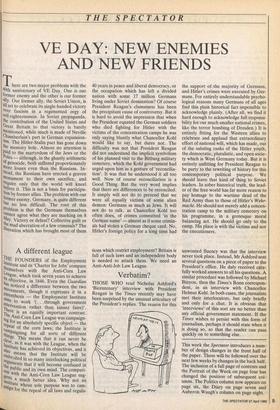THE SPECTATOR
VE DAY: NEW ENEMIES AND NEW FRIENDS
There are two major problems with the 40th anniversary of VE Day. One is our former enemy and the other is our former ally. Our former ally, the Soviet Union, is all set to celebrate its single-handed victory over fascism in a regimented orgy of self-righteousness. In Soviet propaganda, the contribution of the United States and Great Britain to that victory is barely Mentioned, while much is made of Neville Chamberlain's part in German expansion- ism. The Hitler-Stalin pact has gone down the memory hole. Almost no attention is Paid to the martyrdom of the Jews or the Poles — although, in the ghastly arithmetic Of genocide, both suffered proportionately More losses even than the Russians. In- stead, the Russians have erected a graven monument to their own sacrifice, and require only that the world will kneel before it. This is not a basis for participa- tion by former allies. The problem with our former enemy, Germany, is quite different but no less difficult. The root of this Problem is that the Germans themselves .,,!nnot agree what they are marking on 8 71, aY. Victory or defeat? Collective guilt or be mad aberration of a few criminals? The Liberation which has brought most of them
40 years in peace and liberal democracy, or the occupation which has left a divided nation with some 17 million Germans living under Soviet domination? Of course President Reagan's clumsiness has been the precipitant cause of controversy. But it is hard to avoid the impression that when the President equated the German soldiers who died fighting for Hitler with the victims of the concentration camps he was only saying bluntly what Chancellor Kohl would like to say, but dares not. The difficulty was not that President Reagan did not understand the implicit symbolism of his planned visit to the Bitburg military cemetery, which the Kohl government had urged upon him as a gesture of 'reconcilia- tion'. It was that he understood it all too well. Now of course reconciliation is a Good Thing. But the very word implies that there are differences to be reconciled. It simply will not do to pretend that we were all equally victims of some alien demon: Germans as much as Jews. It will not do to talk, as Chancellor Kohl too often does, of crimes committed 'in the German name' — almost as if some crimin- als had stolen a German cheque card. No, Hitler's foreign policy for a long time had
the support of ;the majority of Germans, and Hitler's crimes were executed by Ger- mans. For entirely understandable psycho- logical reasons many Germans of all ages find this plain historical fact impossible to acknowledge plainly. (After all, we find it hard enough to acknowledge full responsi- bility for our much smaller national crimes, like the terror bombing of Dresden.) It is entirely fitting for the Western allies to celebrate and applaud that extraordinary effort of national will, which has made, out of the saluting ranks of the Hitler youth, the democratic, pluralistic, and open socie- ty which is West Germany today. But it is entirely unfitting for President Reagan to be party to the rewriting of history for this contemporary political purpose. We should leave that kind of thing to Soviet leaders. In sober historical truth, the lead- er of the free world has far more reason to pay homage to the wartime dead of the Red Army than to those of Hitler's Wehr- macht. He should not merely add a concen- tration camp to the military cemetery on his programme, in a grotesque moral balancing act. He should go only to the camp. His place is with the victims and not the executioners.


















































 Previous page
Previous page